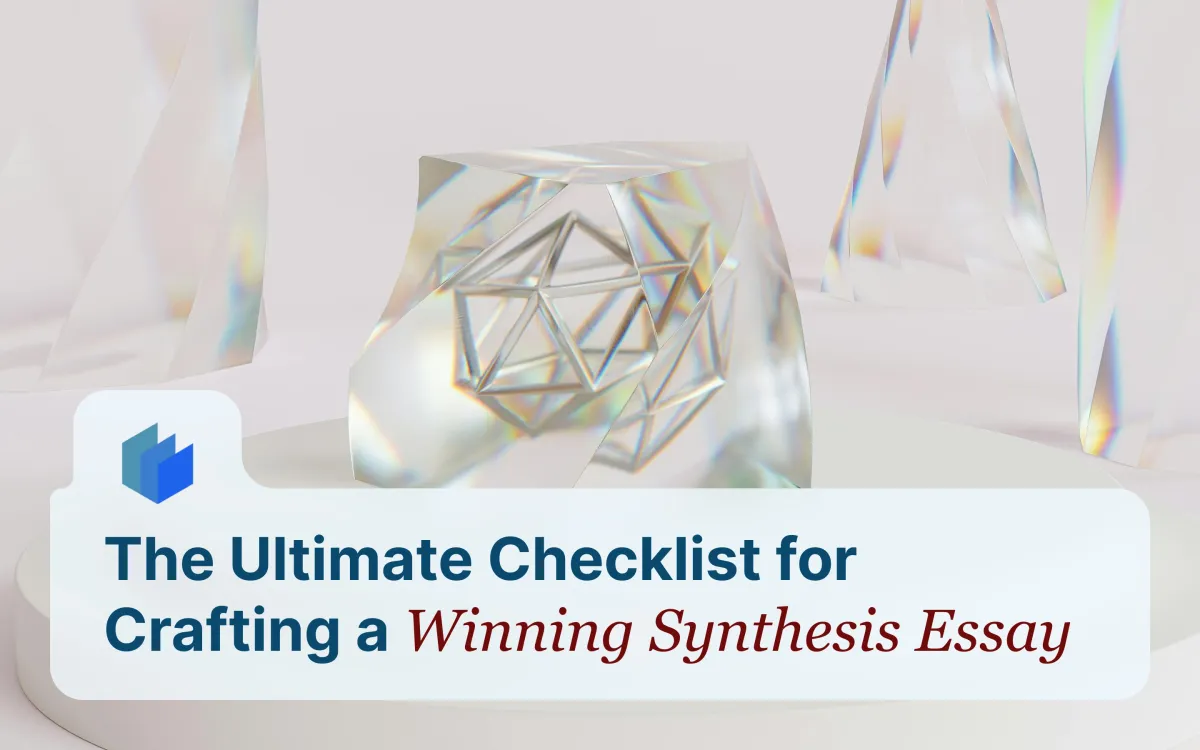The Ultimate Checklist for Crafting a Winning Synthesis Essay
Discover the ultimate checklist for crafting a winning synthesis essay. Learn tips on topic selection, research, thesis development, and writing clarity.

Have you ever wondered why synthesis essays are so important in both academic and professional settings?
This blog will guide you through "The Ultimate Checklist for Crafting a Winning Synthesis Essay." Whether you’re a student trying to get better grades or a professional aiming to improve your writing skills, this checklist is designed to help you. By following these steps, you'll be able to write clear, organized, and compelling synthesis essays.
We will cover everything from choosing a topic and conducting research to structuring your essay and editing your final draft. By the end, you'll have a comprehensive checklist to ensure your synthesis essays are top-notch.
Definition of a Synthesis Essay
A synthesis essay is a type of writing that combines information from different sources to present a new idea or argument. Imagine you're piecing together a puzzle, where each piece is a piece of information from different sources. You gather these pieces and put them together to form a complete picture, which is your main idea or thesis.
The Importance of Synthesis Essays

Synthesis essays are important because they help you develop critical thinking and writing skills. When you write a synthesis essay, you:
- Learn to evaluate different viewpoints and sources of information.
- Practice organizing your thoughts and presenting them clearly.
- Improve your ability to make connections between different pieces of information. These skills are valuable not just in school, but also in your future career and everyday life.
Different Types of Synthesis Essays

There are several types of synthesis essays, each serving a different purpose:
1. Argumentative Synthesis Essay
In this type, you combine information from various sources to support a specific argument or point of view. You take a stand on an issue and use the sources to back up your opinion.
2. Explanatory (or Expository) Synthesis Essay
Here, your goal is to explain a topic or idea by bringing together information from different sources. You're not arguing for one side or the other; instead, you're providing a balanced explanation of the topic.
3. Review Synthesis Essay
This type involves summarizing and combining information from multiple sources to give an overview of a particular subject. A review synthesis essay is often used in literature reviews or extend research papers to show what has already been studied about a topic.
By understanding these different types of synthesis essays, you can choose the best approach for your specific writing task.
Step-by-Step Guide to Writing a Synthesis Essay

Choosing a Compelling Topic
How to Pick a Topic That Is Both Interesting and Researchable
Choosing the right topic for your synthesis essay is crucial because it sets the foundation for your entire paper. Here’s how to pick a topic that is both interesting and researchable:
- Find Your Interests: Think about subjects that you are passionate about or curious to learn more about. When you are genuinely interested in a topic, writing about it becomes much easier and more enjoyable.
- Ensure It's Researchable: Make sure there is enough information available on the topic. Check if you can find various sources like articles, books, or websites that discuss different aspects of the topic. A topic with plenty of resources will help you build a well-rounded essay.
- Narrow It Down: A broad topic can be overwhelming, so try to narrow it down to a specific aspect that you can thoroughly explore. For example, instead of writing about "Technology," focus on "The Impact of Social Media on Teenagers."
- Consider the Assignment Requirements: Always keep in mind any guidelines or requirements given by your teacher or professor. Your topic should meet these criteria to ensure you stay on track.
Examples of Good Synthesis Essay Topics
To give you an idea of what makes a good topic, here are some examples:
- Education:
- "The Benefits and Drawbacks of Online Learning"
- "How Standardized Testing Affects Student Performance"
- Health:
- "The Impact of Diet on Mental Health"
- "Vaccination: Public Health vs. Personal Choice"
- Technology:
- "The Role of Artificial Intelligence in Modern Medicine"
- "The Effects of Video Games on Cognitive Development"
- Environment:
- "Renewable Energy Sources: Pros and Cons"
- "The Influence of Climate Change on Wildlife Migration Patterns"
- Social Issues:
- "The Influence of Social Media on Body Image"
- "Gender Equality in the Workplace: Progress and Challenges"
By following these steps and considering these examples, you can choose a topic that not only captures your interest but also has enough material to research and write a compelling synthesis essay.
Conducting Thorough Research
Finding reliable sources is essential for writing a strong synthesis essay. Here are some tips to help you find trustworthy information:
- Use Academic Databases: Websites like Google Scholar, JSTOR, and your school’s library database are great places to find credible academic articles and papers.
- Check the Author's Credentials: Look for sources written by experts in the field. Authors with relevant qualifications or who are affiliated with reputable institutions are more likely to provide accurate information.
- Look for Peer-Reviewed Articles: These articles have been reviewed by other experts in the field before publication, ensuring the information is accurate and reliable.
- Evaluate the Publication Date: Make sure the information is up-to-date, especially if you're writing about a topic that evolves quickly, like technology or medicine.
- Cross-Check Information: Verify facts by comparing them with multiple sources. If several reputable sources agree on a point, it’s likely to be reliable.
- Use Reputable Websites: Stick to websites that are known for their credibility, like government websites, educational institutions, and well-known news organizations.
How to Take Effective Notes and Organize Research Materials
Once you've found reliable sources, the next step is to take effective notes and organize your research materials. Here’s how:
1. Summarize Key Points
As you read through your sources, write down the main ideas in your own words. This helps you understand the material and avoid plagiarism.
2. Highlight Important Quotes
If a source has a particularly powerful quote or piece of information, highlight it and note the page number. This makes it easier to reference later.
3. Use Note Cards or Digital Tools
Organize your notes using index cards or digital tools like Evernote, Google Keep, or OneNote. Each note should include the main idea, a summary, and the source.
4. Create an Outline
Organize your notes according to the structure of your essay. Group related ideas together and arrange them in a logical order. This outline will serve as a roadmap for writing your essay.
5. Keep Track of Sources
Always write down where you got each piece of information. Include the author, title, publication date, and page number. This will make it easier to create citations and a bibliography later.
6. Review and Revise
Go through your notes periodically to make sure they still make sense and fit into your essay plan. This will help you stay organized and focused as you write.
Developing a Clear Thesis Statement
A thesis statement is the main idea or argument of your essay. It's what you aim to prove or explain. A strong thesis statement has the following characteristics:
- Clear and Specific: It clearly states your main point without being vague. Your readers should understand exactly what your essay is about.
- Debatable: It presents a point of view that others might disagree with. This invites discussion and makes your essay more interesting.
- Focused: It covers only what you will discuss in your essay, keeping you on topic and helping to organize your thoughts.
- Supportable: It can be backed up with evidence and examples from your research. You should be able to provide facts, quotes, and data to support your thesis.
Examples and Non-Examples
To better understand what makes a good thesis statement, let's look at some examples and non-examples.
Example 1: Clear and Specific
- Good: "Social media negatively impacts teenagers' mental health by increasing feelings of loneliness and anxiety."
- Why it's good: This thesis is clear and specific. It tells the reader exactly what the essay will discuss and what the main point is.
- Bad: "Social media is bad."
- Why it's bad: This thesis is too vague and general. It doesn't specify what aspect of social media is bad or why.
Example 2: Debatable
- Good: "Online education is more effective than traditional classroom learning for college students."
- Why it's good: This thesis is debatable. Some people might agree, while others might disagree, which makes for a compelling essay.
- Bad: "Online education is a way to learn."
- Why it's bad: This statement is a fact, not an argument. There's no room for debate or discussion.
Example 3: Focused
- Good: "The introduction of renewable energy sources can significantly reduce global greenhouse gas emissions."
- Why it's good: This thesis is focused on a specific solution to a problem. It's clear what the essay will be about and what it aims to prove.
- Bad: "Global warming is caused by various factors."
- Why it's bad: This thesis is too broad. It doesn't give a clear direction for the essay.
Example 4: Supportable
- Good: "Implementing a four-day workweek can improve employee productivity and job satisfaction."
- Why it's good: This thesis can be supported with evidence from studies and examples from companies that have tried a four-day workweek.
- Bad: "A four-day workweek is better."
- Why it's bad: This thesis is too simplistic and lacks detail. It doesn't indicate how or why a four-day workweek is better.
Editing and Proofreading Checklist

Ensuring Each Paragraph Supports the Thesis
Every paragraph in your essay should contribute to proving your thesis statement. Here’s how to ensure that happens:
- Start with a Topic Sentence: Begin each paragraph with a sentence that states the main idea of the paragraph. This idea should relate directly to your thesis.
- Use Evidence: Include facts, quotes, or examples from your research that support the main idea of the paragraph.
- Explain the Evidence: After presenting your evidence, explain how it supports your thesis. Connect the dots for your reader.
- Stay Focused: Stick to one main idea per paragraph. If you find yourself talking about something else, it’s better to start a new paragraph.
Logical Flow and Transitions Between Ideas
Your essay should flow smoothly from one idea to the next. Here’s how to achieve that:
- Use Transition Words: Words like "however," "therefore," "in addition," and "consequently" help connect your ideas and guide the reader through your essay.
- Organize Logically: Arrange your paragraphs in a logical order. For example, if you’re writing about causes and effects, discuss the causes first and then the effects.
- Repeat Key Terms: Repeating key terms or phrases can help tie your paragraphs together and remind the reader of the main ideas.
- Link Back to the Thesis: Regularly remind the reader of your thesis by linking back to it in your paragraphs. This keeps your argument focused and clear.
Grammar and Style Considerations
Good grammar and style make your essay easy to read and professional. Here’s what to keep in mind:
Common Grammar Mistakes to Avoid
- Subject-Verb Agreement: Make sure the subject and verb in each sentence agree in number (e.g., "She writes" vs. "They write").
- Pronoun-Antecedent Agreement: Ensure pronouns agree with the nouns they replace (e.g., "Everyone should bring their own lunch" should be "Everyone should bring his or her own lunch").
- Comma Usage: Use commas to separate items in a list, after introductory phrases, and to set off non-essential information.
- Run-On Sentences: Avoid run-on sentences by using periods, commas, or conjunctions to separate independent clauses.
Tips for Maintaining a Formal Academic Tone
- Avoid Slang and Informal Language: Use formal language and avoid slang, contractions (e.g., use "do not" instead of "don’t"), and casual expressions.
- Use Third Person: Write in third person (he, she, it, they) instead of first person (I, we) to maintain an objective tone.
- Be Clear and Concise: Avoid wordiness. Get to the point without unnecessary fluff.
- Use Precise Vocabulary: Choose words that clearly convey your meaning and avoid vague terms.
Citation and Plagiarism
Properly citing your sources and avoiding plagiarism are crucial in academic writing. Here’s how to do it:
Properly Citing Sources in the Chosen Citation Style (APA, MLA, etc.)
- In-Text Citations: When you quote, paraphrase, or refer to information from a source, include an in-text citation. This usually includes the author’s last name and the year of publication (APA) or the author’s last name and page number (MLA).
- Reference List: At the end of your essay, include a list of all the sources you cited. Follow the specific format for your citation style (e.g., APA, MLA, Chicago).
- Use Citation Tools: Tools like EasyBib, Citation Machine, and your word processor’s built-in citation features can help format your citations correctly.
Using Plagiarism Check Tools to Ensure Originality
- Online Plagiarism Checkers: Use tools like Grammarly, Turnitin, or Copyscape to check your essay for unintentional plagiarism. These tools compare your text to a vast database of sources and highlight any matches.
- Paraphrase Properly: When you rephrase someone else’s ideas, make sure you do it in your own words and cite the original source.
- Quote Accurately: Use quotation marks for direct quotes and include a citation to give credit to the original author.
By following these steps, you can ensure your essay is clear, coherent, and free from grammatical errors. Proper citation and plagiarism checks will help you maintain academic integrity and produce a polished, professional essay.
Conclusion
Writing a synthesis essay might seem challenging, but with the right approach, it can be a rewarding experience. By following "The Ultimate Checklist for Crafting a Winning Synthesis Essay," you can make the process much easier and more effective.
Remember to choose an interesting and researchable topic, conduct thorough research, and take effective notes. Develop a clear thesis statement, ensure each paragraph supports your thesis, and maintain a logical flow throughout your essay.
Pay attention to grammar and style, and always cite your sources properly to avoid plagiarism.
Frequently Asked Questions
1. What is a synthesis essay?
A synthesis essay combines information from multiple sources to present a new idea or argument.
2. What are the 5 steps to writing a synthesis essay?
The five steps to writing a synthesis essay are: choosing a topic, conducting research, developing a thesis, organizing the essay, and revising it.
3. What is a synthesis example?
A synthesis example is combining different articles on climate change to support a new perspective on its impacts.
4. Is a synthesis essay like an argumentative essay?
Yes, a synthesis essay can be like an argumentative essay, but it focuses on combining information from various sources to support a single argument.
5. What are synthesis essay topics?
Synthesis essay topics include subjects like the effects of social media, the impact of technology on education, or renewable energy solutions.



